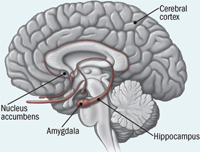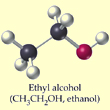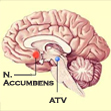Sunday, 25 September 2016
How Different Parts of the Brain Co-operate

Perhaps one of the hardest things to understand about the brain is the way that it is organized into networks. In this post, I will discuss a 2015 study, on the brain structures involved in delayed gratification, that makes this complex subject a bit easier to grasp. (more…)
Pleasure and Pain | No comments
Wednesday, 22 May 2013
Links on Pleasure and Drugs
 This week, as I have before in this blog, I am posting a set of new links to other web sites that discuss a subject covered in The Brain from Top to Bottom. For each link, I also provide a brief description of the relevant article or other content on the site in question.
This week, as I have before in this blog, I am posting a set of new links to other web sites that discuss a subject covered in The Brain from Top to Bottom. For each link, I also provide a brief description of the relevant article or other content on the site in question.
The subject this week is the sub-topic “Pleasure and Drugs” under the topic “Pleasure and Pain”, and the sites in question all provide insights into the way that various drugs affect our brains. As you see, the first two sites deal with alcohol. It is worth remembering that however legal alcohol may be, it too is a psychoactive substance—in other words, a drug. Many people are getting CBT treatment of addiction to get their lives back on track. (more…)
Pleasure and Pain | Comments Closed
Monday, 6 May 2013
What Are People’s Deepest Motivations?

Economists have long regarded financial gain as one of the primary motives that drive human beings. But research in the cognitive sciences increasingly shows that while money may induce people to work harder physically, it seems to have no effect at all where mental tasks are concerned.
As author Daniel Pink describes in an illustrated talk to which a link is provided below, studies in various countries have shown that giving people more money does not stimulate creative thought, even when the amounts offered are the equivalent of several weeks’ pay. (more…)
Pleasure and Pain | 3 comments »
Monday, 25 February 2013
Links on Pleasure-Seeking Behaviour
 This week, as I have before in this blog, I am posting a set of new links to other web sites that discuss a subject covered in The Brain from Top to Bottom. The subject this week is the sub-topic “Pleasure-Seeking Behaviour”, under the topic “Pleasure and Pain”. For each link, I also provide a brief description of the content on the site in question. (more…)
This week, as I have before in this blog, I am posting a set of new links to other web sites that discuss a subject covered in The Brain from Top to Bottom. The subject this week is the sub-topic “Pleasure-Seeking Behaviour”, under the topic “Pleasure and Pain”. For each link, I also provide a brief description of the content on the site in question. (more…)
Pleasure and Pain | Comments Closed
Monday, 30 April 2012
Theories on Drug Addiction

The human brain contains circuits that provide us with pleasure to reinforce behaviors that are helpful to our survival. The brain thus naturally favours those behaviors that lead us to seek euphoria. You can check out Pacific Ridge online to learn about their insights regarding alcohol addiction.
The abusive consumption of a drug can result in dependency on it. The various phenomena associated with drug dependency—also commonly referred to as “drug addiction”—are fairly well known: initial pleasure, then tolerance, withdrawal, and so on. We recommend people struggling with addiction to take a look at The Ohana Rehab Center website to learn more information about recovery.
Experts have identified several signs of drug dependency. If someone displays several of them, that is a good indication that they have become dependent on the drug in question. Luckily on private London rehab clinics like Addcouncel.
These signs include:
-A persistent desire for the drug and an inability to stop taking it
-The development of a tolerance for the drug that forces them to keep taking larger doses to achieve the same effects
-The onset of withdrawal symptoms when they cannot obtain the drug
-Spending a great deal of their time obtaining the drug, consuming it, and recovering from its effects
-An inability to stop or control their consumption of the drug, even when it goes against their own values
-Continuing to take the drug, even when they recognize the major physical, psychological, and social problems caused by this behaviour
Long term alcohol use can lead to many health problems and may cause the user to feel more at risk and anxious. There are a number of physical and emotional effects associated with long term alcohol use that can have an impact on the lives of those who drink on a regular basis. If you know someone struggling with addiction and having these symptoms, contact holistic wellness program to help them recover and get their life back on track.
If you have experienced any of these signs, we highly suggest to look for a drug rehab program before it is too late.
But these phenomena are so complex that it is hard to construct satisfactory models for them. Hence, many theories have been developed to try to explain drug dependency/addiction in order to elaborate the appropriate Drug Addiction Treatments. You can click on the states served by RecoveryDelivered.com for more information about Suboxone in that specific state.
One of these theories is based on the traditional hedonist principle that people seek pleasure and avoid pain. For other theorists, the main cause of drug addiction is the desire to alleviate the suffering that addicts experience when their drug is withdrawn. If you know someone who is dealing with this problem, tell them to visit Next Wind Recovery to help them get through this difficult situation. Still another theory holds that drug-dependent people suffer from a dysfunction of the systems of the frontal cortex that normally regulate decision-making and impose inhibitory controls on behaviour.
Pleasure and Pain | No comments







